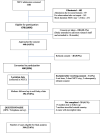Successful breastfeeding following a level II NICU stay in Qatar - a longitudinal study
- PMID: 36348445
- PMCID: PMC9640813
- DOI: 10.1186/s13006-022-00513-5
Successful breastfeeding following a level II NICU stay in Qatar - a longitudinal study
Abstract
Background: Exclusive breastfeeding is an essential need for mothers and newborn babies, but cultural practices and employment demands significantly influence feeding practices. The association between neonatal intensive care unit (NICU) admission and breastfeeding outcomes are variable. Data for Qatar and Middle East, in particular, are limited. Hence, this study aims to estimate the rate of breastfeeding at the time of NICU discharge and the rate of successful breastfeeding after NICU discharge in Qatar during well-baby follow-ups.
Methods: This quantitative longitudinal study was conducted over 18 months from January 2019 and included neonates born in Al Wakra Hospital admitted to the NICU. Demographic data, feeding during NICU stay and at discharge were obtained from lactation charts. Data regarding feeding practices after discharge were obtained through a questionnaire administered at 4 weeks and 8 weeks in well-baby clinics. Descriptive statistics and logistic regression analyses were performed to determine the rates of breastfeeding and the association between the various factors.
Results: Of the 678 participants screened, 364 were eligible for analysis. The rates of exclusive breastfeeding were 20% (73/364), 54% (197/364) and 42% (153/364) at discharge, 4 weeks and 8 weeks, respectively. Any breastfeeding was 64% (233/364), 40% (146/364) and 43% (157/364) at discharge, 4 weeks and 8 weeks, respectively. Logistic regression analysis showed that neonates who had NICU stays longer than 4 days had a higher rate of exclusive breastfeeding at discharge (adjusted odds ratio 3.000; 95% CI 1.25, 7.198) but had a reduced rate of breastfeeding and higher rate of formula feeding during follow-ups. Although breastfeeding rates were better in preterm infants at NICU discharge, regression analysis showed that none of the other factors, including gestation and maternal education had a significant association with the rate of exclusive breastfeeding at the time of discharge or during follow-ups.
Conclusions: The overall breastfeeding rates from this level II NICU in Qatar are better than previously available data. Studies with extended follow-up and assessment of intervention methods should be planned to improve and sustain the practice of exclusive breastfeeding.
Keywords: Breastfeeding; Feeding practices after NICU discharge; Preterm feeding.
© 2022. The Author(s).
Conflict of interest statement
There are no competing interests.
Figures
Similar articles
-
Factors associated with post NICU discharge exclusive breastfeeding rate and duration amongst first time mothers of preterm infants in Shanghai: a longitudinal cohort study.Int Breastfeed J. 2022 May 2;17(1):34. doi: 10.1186/s13006-022-00472-x. Int Breastfeed J. 2022. PMID: 35501877 Free PMC article.
-
Breastfeeding in Neonates Admitted to an NICU: 18-Month Follow-Up.Nutrients. 2022 Sep 16;14(18):3841. doi: 10.3390/nu14183841. Nutrients. 2022. PMID: 36145216 Free PMC article.
-
Factors associated with exclusive breastfeeding in low birth weight infants at NICU discharge and the start of complementary feeding.Asia Pac J Clin Nutr. 2013;22(2):270-5. doi: 10.6133/apjcn.2013.22.2.11. Asia Pac J Clin Nutr. 2013. PMID: 23635373
-
An integrative review of factors that influence breastfeeding duration for premature infants after NICU hospitalization.J Obstet Gynecol Neonatal Nurs. 2014 May-Jun;43(3):272-81. doi: 10.1111/1552-6909.12297. Epub 2014 Apr 1. J Obstet Gynecol Neonatal Nurs. 2014. PMID: 24689979 Review.
-
Nutrition, growth, and allergic diseases among very preterm infants after hospital discharge.Dan Med J. 2013 Feb;60(2):B4588. Dan Med J. 2013. PMID: 23461996 Review.
References
-
- Saaty AH, Cowdery J, Karshin C. Practices of breastfeeding among Arab mothers living in the United States. World J Med Sci. 2015;12:183–188.
-
- UNICEF_Expanded_Global_Databases_ExclusiveBF_2021. https://www.unicef.org/reports/unicef-annual-report-2021.
Publication types
MeSH terms
LinkOut - more resources
Full Text Sources
Medical



